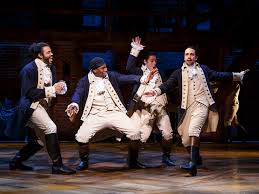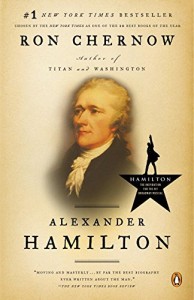Who w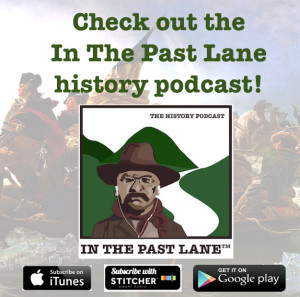 as Hercules Mulligan? Well, he certainly was a man with one of the great names in American history. Hercules Mulligan – you can’t make up a name like that. But beyond that great name, Hercules Mulligan has existed as a mere footnote for the last 200+ years of American history. That is, until about a year ago when, “Hamilton, The Musical,” opened on Broadway. The show, which has gone on to become one of the biggest hits in recent Broadway history, chronicles the life of the founding father Alexander Hamilton. It features well-known figures like Thomas Jefferson and George Washington, but also people lost to history like Hercules Mulligan. He played a key role in the life of Hamilton, and served as one of Washington’s most important spies during the American Revolution.
as Hercules Mulligan? Well, he certainly was a man with one of the great names in American history. Hercules Mulligan – you can’t make up a name like that. But beyond that great name, Hercules Mulligan has existed as a mere footnote for the last 200+ years of American history. That is, until about a year ago when, “Hamilton, The Musical,” opened on Broadway. The show, which has gone on to become one of the biggest hits in recent Broadway history, chronicles the life of the founding father Alexander Hamilton. It features well-known figures like Thomas Jefferson and George Washington, but also people lost to history like Hercules Mulligan. He played a key role in the life of Hamilton, and served as one of Washington’s most important spies during the American Revolution.
Mulligan was born in County Antrim, in northern Ireland in 1740. Six years later, he emigrated with his family to colonial New York City. His father was a wealthy merchant, so Hercules enjoyed a comfortable life and received a very good education. By the mid 1760s, he was himself a prosperous businessman, operating a shop that sold cloth and custom tailored suits.
By the mid 1760s, Hercules Mulligan had also joined the Sons of Liberty. This early Patriot group had formed in 1765 to resist the Stamp Act—you know, the whole, “No taxation without representation” thing. The year 1765 was just the beginning of a decade of turmoil over British policies and Mulligan remained active member of the Sons of Liberty.
In 1773, the same year as the Boston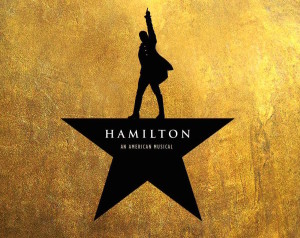 Tea Party, Mulligan met a 16-year-old orphan from the British West Indies. His name was Alexander Hamilton. Mulligan offered to rent him a room while he studied at Kings College (the forerunner to Columbia University). When Hamilton wasn’t studying, he hung around Mulligan’s store and listened to him talk with his friends, many of them fellow Sons of Liberty, about British abuses and the need to resist them. Not surprisingly, Hamilton soon joined the Sons of Liberty.
Tea Party, Mulligan met a 16-year-old orphan from the British West Indies. His name was Alexander Hamilton. Mulligan offered to rent him a room while he studied at Kings College (the forerunner to Columbia University). When Hamilton wasn’t studying, he hung around Mulligan’s store and listened to him talk with his friends, many of them fellow Sons of Liberty, about British abuses and the need to resist them. Not surprisingly, Hamilton soon joined the Sons of Liberty.
In 1775 Hamilton penned a widely read article highly critical of Great Britain’s increasingly harsh treatment of the colonies. Two months later, the first shots of the American Revolution were fired at Lexington and Concord. Sixteen months after that, the British invaded New York with a massive army and armada of 300 ships. In the ensuing Battle of Long Island in August 1776, George Washington and his Continental Army barely escaped capture and destruction. From that point until the end of the war, New York City remained under British occupation and it became a key center of military planning for the British.
As the war progressed, George Washington recognized the importance of establishing an intelligence network in New York to acquire information on British military plans. Accordingly, he put in place a network of spies that came to be known as the Culper Ring. And one of its most important members was Hercules Mulligan. In all likelihood, it was Hamilton—now an officer in Washington’s army—who recommended him.
Now, it’s important to point out that spying was dangerous business. In September 1776, the British caught Nathan Hale spying in the New York area and hanged him in Manhattan, not far from Mulligan’s home. So Mulligan and the other Culper Ring spies had to be very careful.
Fortunately for Hercules Mulligan, his business put him in an ideal position to gather information without arousing suspicion. His shop had to become very popular among colonial elites before the war, and during the military occupation it proved equally popular among British officers who were convinced that Mulligan was a Loyalist. In those days, tailoring shops were kind of like barbershops or coffee shops where customers hung out and talked freely about news and gossip. So while Mulligan went about his business of selling cloth and measuring, tailoring, and fitting British officers into their new suits, he listened for loose talk of military plans. Whenever he obtained important information about troop movements or changes in overall strategy, he passed it on to George Washington.
As Hercules Mulligan in “Hamilton” puts it:
A tailor spyin’ on the British government!
I take their measurements, information and then I smuggle it…
To my brother’s revolutionary covenant
I’m runnin’ with the Sons of Liberty and I am lovin’ it!
See, that’s what happens when you up against the ruffians
We in the shit now, somebody gotta shovel it!
Hercules Mulligan, I need no introduction
When you knock me down I get the fuck back up again!
In one crucial instance, Mulligan heard of a British plot to capture George Washington. He passed on the information, allowing Washington to change his plans and foil the plot. Needless to say, had Washington been captured, the Patriot cause would have been doomed.
Mulligan played his role of tailor/spy perfectly for the whole war. But as the conflict came to an end, he had a big problem. He had performed so convincingly as a Loyalist, that most New Yorkers were convinced that he WAS a Loyalist. This was not a good position in which to be in the early 1780s. Loyalists were being driven from the colonies by angry Patriots. Some were tarred and feathered and a few were even killed.
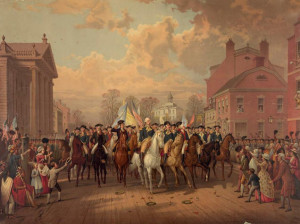
General George Washington arrives with Governor Clinton and troops in New York on November 26, 1783 as the defeated British evacuated the city.
Fortunately for Mulligan, none other than George Washington came to his aid. On November 26, 1783, General Washington triumphantly processed into New York City as the last British ships departed. As he reached Lower Manhattan, he stopped at the home of Hercules Mulligan. The two enjoyed a breakfast together after which Washington publicly praised Mulligan as, “A true friend of liberty.” No one threatened Hercules Mulligan again after that!
Mulligan, unlike the ill-fated Hamilton, went on to enjoy a long and prosperous life in the years that followed. He died in New York in 1825 at the age of 85. Then he faded into historical obscurity—but not permanently.
In 2004, Ron Chernow published a best-selling biography of Alexander Hamilton. In it, he related the role Mulligan played in Hamilton’s early life and his role as a spy in the Revolutionary War. And this is the book Lin-Manuel Miranda read that inspired him to create, “Hamilton, the Musical.” Miranda has said in interviews that he was drawn to Mulligan both for his unique name and for the important role he played in Hamilton’s life.
So there you have it. The incredible story of the great Irish spy helped win the American Revolution. Who knew?
Further reading:
Ron Chernow, Alexander Hamilton (2004)
Michael O’Brien, Hercules Mulligan: Confidential Correspondent of General Washington (1937)

